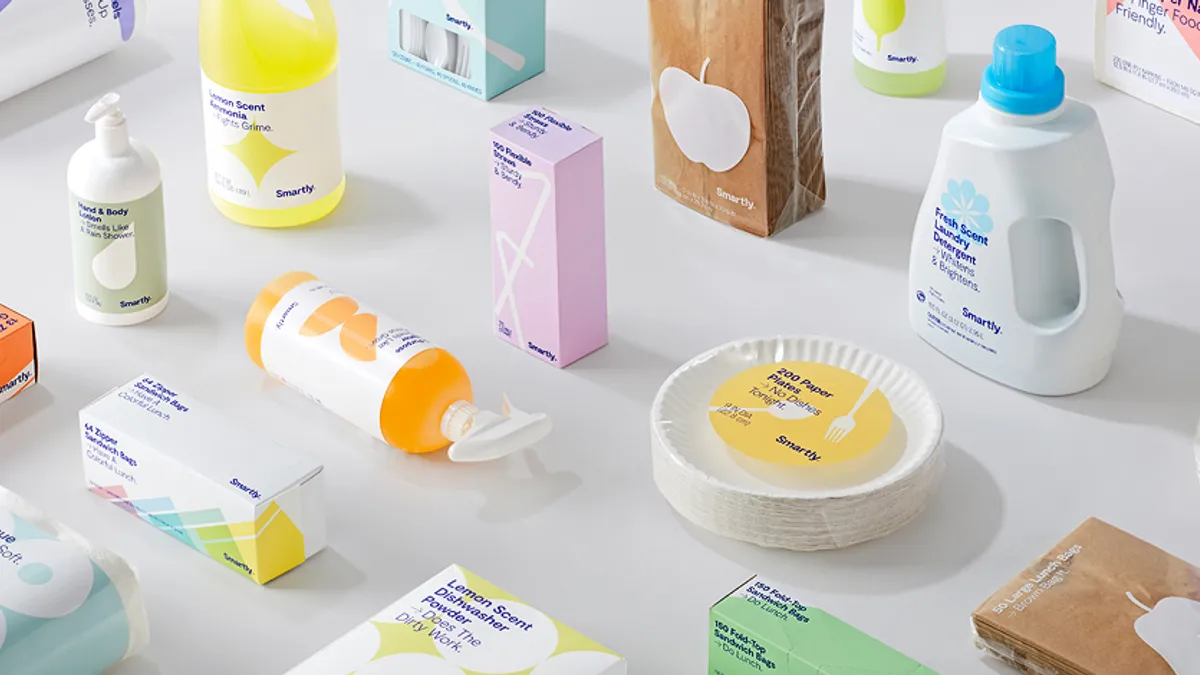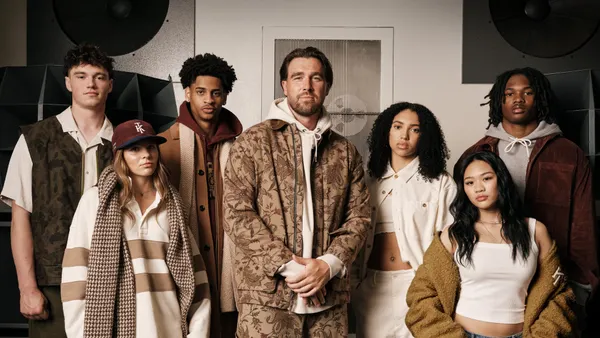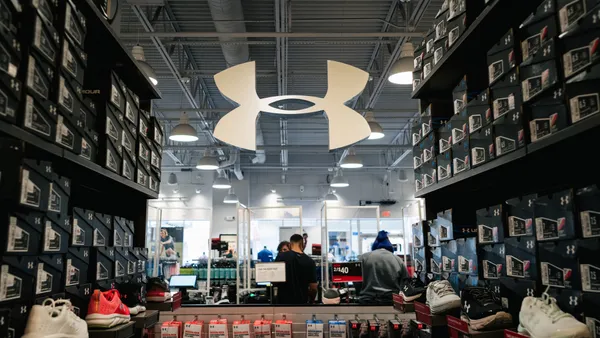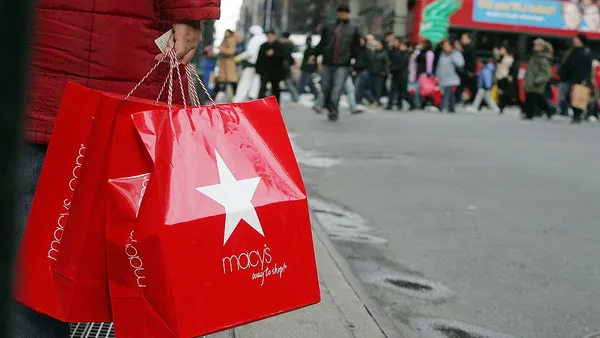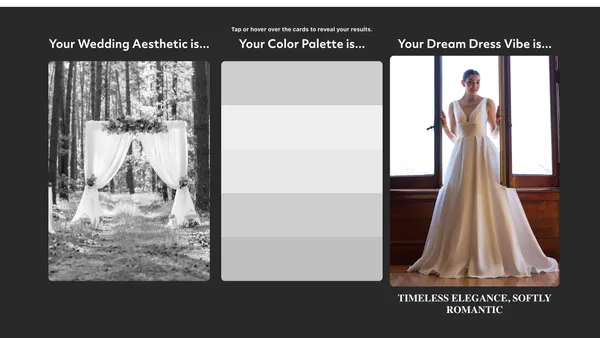Private label product has become a critical differentiator for mass merchants over the last few years. Amazon, Target and Walmart have all stepped up their owned brand offerings to give customers a better reason to shop exclusively with them and to protect their own margins.
The strategy has been a prominent part of Target's "cheap chic" merchandise playbook. Since 2016, Target has launched 20 private label brands in apparel, home decor, electronics and personal care.
The company's first major success story was Cat & Jack, a children's apparel line that launched in 2016. The brand has also experimented with a baby box subscription service, which helped propel it to a milestone few Target private label brands have achieved – its sales exceeded $2 billion in a little over a year. Additionally, at a media event in New York in October, CEO Brian Cornell announced that year-old women's brand A New Day has delivered over $1 billion in total sales.
The success of these brands has helped cement private label as a priority for Target on its quest to revamp its stores and digital presence with a $7 billion investment. Over the last year, the company has steadily launched brand after brand in key categories.
Here's a look at those eight brands and why they're worth keeping an eye on.
-
Universal Thread
In an effort to freshen up its apparel assortment, the mass merchant kicked off the year with a women's lifestyle denim brand, Universal Thread. While the brand is "grounded" in denim, it also includes dresses, tops, shoes and accessories all priced between $5 and $39.99.
The brand was also the first to offer a size range between 00-26W, Target chief merchandising officer Mark Tritton said in a company blog post. It's also priced about 10% lower than the rest of its assortment, he also said, adding that those decisions were made based off of learnings from other private label apparel brands like A New Day.
-
Opalhouse
The making of Opalhouse involved flights to Paris, Lisbon and Mallorca to inspire the design team to build a new "eclectic" home decor line, Opalhouse, which incorporates "pressed glass, jewel-tone silks and velvets." The line, announced in February, features more than 1,300 products in bedding, bath, decor, tabletop and furniture, with most items priced under $30.
The brand is part of a bigger private label push into the home category, which also includes the introduction of Project 62 (which launched in Sept. 2017) and Hearth & Hand with Magnolia (which debuted in Nov. 2017). In the home decor category, the company has said its mission is to "help bring [shoppers'] Pinterest-worthy home design dreams to life." While Pinterest wants to enable consumers to curate their lifestyle, Target is hoping to do it for them with lines like Opalhouse that tap into "authentic" artistry while remaining reasonably priced.
-
Heyday
This summer, Target launched its first consumer electronics private label brand, Heyday, offering over 150 tech accessories like speakers, headphones, phone cases and chargers priced between $20 and $60. The move was a step into Amazon's territory. The e-commerce giant's AmazonBasics line has been a top seller of batteries, chargers and other basics. Target's line, fitting with its style, made a conscious effort to offer an assortment that merges "functional," "fashion" and "fun" with monochromatic designs and "luxe accents."
So far it's resonating with consumers, Tritton told Forbes in August, adding that the company is thinking of adding more categories. The line is also a move specifically geared at relating to the Gen Z and millennial shopper, Tritton previously said. That's an increasingly important age demographic for Target and really anyone in retail, considering their growing purchasing power.
-
Wild Fable
In another effort to reach Gen Z, Target announced the launch of women's apparel brand Wild Fable. The private label's accessories and shoes are all priced under $40 and range in sizes from 0 to 26W. In Target's blog post debut of the line, it detailed its knowledge of the young generation, acknowledging they like to shop in-person while also being engaged digitally. To that end, in-store displays are meant to be curated in an interactive way where guests can mix and match items to create their look.
Marketing on social media channels like YouTube, Snapchat and Instagram are also a key part of reaching younger consumers – a strategy that aims to build relationships with "the next generation of guests and show them, authentically, the role Target can play in their lives now and into the future,” Rick Gomez, Target executive vice president and chief marketing officer, said in a blog post at the time the brand was announced.
-
Original Use
Target has described young men's apparel private label brand Original Use as "street-meets-vintage-modern," with prices ranging from $10 to $40 and available in big & tall sizes. The line chases after Gen Z and millennial shoppers in the same way that Wild Fable does.
The convergence of physical and digital appears to be important to this brand as well, although the company does not detail what interactive elements will be offered, aside from photos and styles created by shoppers on Target's website and social platforms.
-
Made By Design
This summer, Tritton described its latest home brand, Made By Design, as "the ultimate expression of our DNA — a commitment to the democratization of impeccable design." The brand is made up of over 750 basics like towels, cooking utensils, glassware, plates, pots, closet organizers and more, priced between $1 and $260, with most items under $30. A focus on home and essentials to differentiate is fitting for Target, considering those categories have contributed to a steady sales lift over the last few quarters.
This line, in particular, is geared at helping customers fill their first homes, according to a company blog post. The products were designed with a modern aesthetic but with a practical purpose (think spatulas that can withstand 450 degrees, warp-resistant pans and stackable wine glasses). The private label takes aim at home basics in the eyes of young professionals — a consumer demographic Target has heavily invested in attracting this year with services like home delivery from stores in cities, same-day delivery and small-format stores.
-
Prologue
Target's private label core is woven together by "cheap chic" apparel lines that scream "Tarzhay" rather than "I bought this at a mass merchant." Prologue, a "sophisticated, understated" line of blouses, skirts, dresses and trousers aims to cater to the working woman on a budget. The clothing, which ranges in size from 0-16 (with some items available in up to 26W online), is priced between $12.99 and $49.99 and launched in September.
Target's 2018 push into private label has brought in a new wave of apparel brands that are replacing once billion dollar brands Mossimo and Merona, which have been phased out. The category is a key competitive area in the fight against both Amazon and Walmart. Amazon is slated to soon be the number one apparel retailer in the U.S. while Walmart is in the midst of a digital rebrand that's attracting partners like Lord & Taylor and acquisitions of trendy digitally native apparel brands like Bonobos, Modcloth and Eloquii.
-
Smartly
In October, Target launched a private label brand to compete in the consumer products category. Most of the 70 product personal care line, which is made up of basics like body lotion, paper plates and razor blades, among other items, are priced under $2. The new line was designed mostly with price in mind, according to the company, which estimates that Smartly products cost roughly 70% less than national brands.
The line is a competitive move against rivals Walmart and Amazon, as well as newcomers like direct-to-consumer startup Brandless, which prices all of its products under $3. While Target often leans on the "chic" side of "cheap and chic," this private label is all about attracting budget-conscious shoppers.


